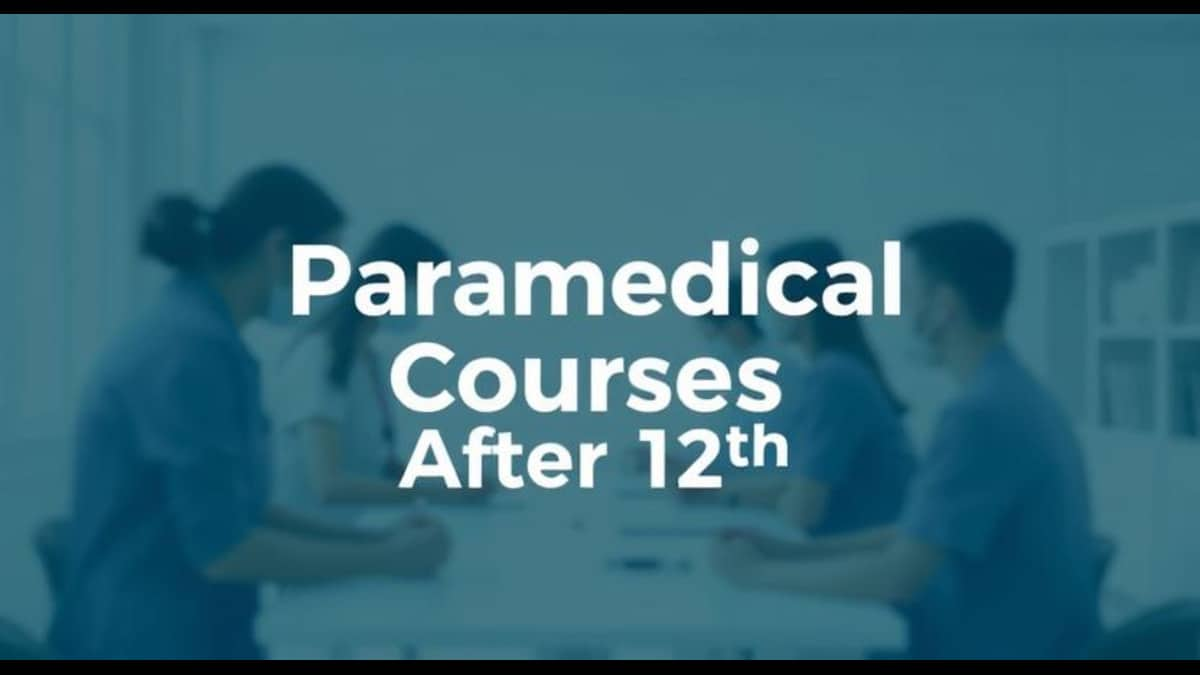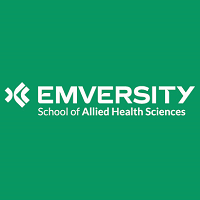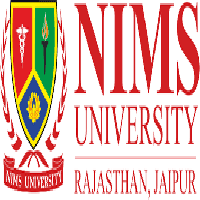JSS University Mysore 2025
NAAC A+ Accredited| Ranked #24 in University Category by NIRF | Applications open for multiple UG & PG Programs
The field of paramedical science is an important part of the healthcare industry, offering a wide range of career opportunities for students who have completed their 12th grade. The list of paramedical courses after 12th is long. Some of the well-known para-medical courses after 12th include a Diploma or a bachelor's degree in laboratory technology, radiography, physiotherapy, optometry, and more. Read the full article to know comprehensive details about the paramedical courses after 12th class, the required eligibility criteria, the admission process and much more.

Candidates allotted seats in Kerala NEET UG counselling 2025 round 1 are required to produce the printout of the sheet, allotment memo and the documents before the college authorities at the time of admission.
Paramedical courses are specialised training programmes designed to equip students with the skills and knowledge required to assist medical professionals in diagnosing, treating, and managing patients. These are some of the medical courses without NEET. These courses cover a wide range of disciplines, including laboratory technology, radiography, physiotherapy, optometry, and more. Paramedical professionals are essential in hospitals, clinics, diagnostic centres, and other healthcare settings, providing critical support to doctors and nurses.
There are many top paramedical courses after 12th available for students after completing their 12th grade. Here are some of the most popular options a student can choose from -
S.No. | Course Name | Duration | Eligibility |
|---|---|---|---|
2 years | 10 + 2 with Science (Physics, Chemistry, Biology) | ||
Diploma in Radiography and Imaging Technology | 2 years | 10 + 2 with Science (Physics, Chemistry, Biology) | |
4 years | 10 + 2 with Science (Physics, Chemistry, Biology) | ||
4 years | 10 + 2 with Science (Physics, Chemistry, Biology) | ||
2 years | 10 + 2 with Science (Physics, Chemistry, Biology) | ||
Diploma in Dialysis Technology | 2 years | 10 + 2 with Science (Physics, Chemistry, Biology) | |
Diploma in Medical Record Technology (DMRT) | 2 years | 10 + 2 with any stream | |
Diploma in Nursing Care Assistant (DNCA) | 2 years | 10 + 2 with any stream | |
3 years + 1 year internship | 10 + 2 with Science (Physics, Chemistry, Biology) | ||
3 years | 10 + 2 with Science (Physics, Chemistry, Biology) |
Most of the paramedical courses require a science background. However, there are several career options available for students from arts backgrounds. The arts student paramedical course include diploma and certificate courses.
X-Ray/Radiology Assistant (technician)
MRI Technician
Medical Laboratory Assistant
Dialysis Technician
Operation Theater Assistant
CT scan Technician
Nursing care Assistant
Dental Assistant
ECG assistant
Ophthalmic Assistant
NAAC A+ Accredited| Ranked #24 in University Category by NIRF | Applications open for multiple UG & PG Programs
Admissions Open for multiple allied and health sciences programs across 5 campuses | Ranked #7 in India by NIRF, NAAC A++ Accredited
Paramedical courses open up a wide range of career opportunities in the healthcare sector. Some of the common job roles for paramedical graduates include:
Medical Lab Technician - Performs laboratory tests and analyses to assist in the diagnosis of diseases
Radiographer/Imaging Technician - The work profile includes operating imaging equipment to produce diagnostic images.
Physiotherapist - Provides physical therapy to patients with injuries or disabilities.
Optometrist - Helps in diagnosing and treating eye disorders, prescribing glasses, and managing eye health.
Operation Theatre Technician - Assists in surgical procedures by managing operation theatre equipment.
Dialysis Technician - Work profile includes operating dialysis machines and caring for patients with kidney failure.
Medical Record Technician - Helps in managing medical records and health information systems.
Nursing Assistant - Assists in providing basic patient care and assistance to nurses.
Cardiac Care Technologist - The work profile involves assisting in the diagnosis and treatment of heart conditions.
The healthcare industry is growing rapidly, and there is a constant demand for skilled paramedical professionals. With an ageing population and increasing risk of chronic diseases, the need for healthcare services is going to rise, creating numerous job opportunities for paramedical students.
Paramedical courses offer a wide range of career options, allowing students to choose a field that aligns with their interests and strengths. Whether it's laboratory work, imaging technology, or patient care, there is a paramedical course that suits the career aspiration of one.
Many paramedical courses are of short duration, ranging from 6 months to 3 years, making them an attractive option for students who want to start their careers quickly. Additionally, these courses are generally more affordable compared to traditional medical degrees, making them accessible to a broader range of students.
Even though you have a valid NEET score, 396 is too low to meet the MBBS admission cutoff at KPC Medical College, especially in the general category. To pursue MBBS there, you’d need a substantially higher score closer to the typical cutoff range.
Dhanashri, With a NEET score of 371 and an All India Rank of 269,554, landing a seat in a government MBBS college in Maharashtra under the state quota is quite unlikely. Typically, the closing marks for Maharashtra government colleges are much higher. For instance, here are the 2024 state quota closing marks:
Open (General): around 639 marks
OBC: 638 marks
SC: 557 marks
Since 371 falls well below even the SC cutoff, you’re not in the running for MBBS seats this counselling cycle.
What you can do next:
Look into BDS (Dental) or AYUSH (like BAMS/BHMS) options in government colleges—cutoffs there are lower.
Consider private medical colleges, as their cutoffs might match your score better.
Also think about reappearing in future NEET exams—improving your score could open up more opportunities.
Hello!
With 350 marks in NEET 2025 under the EWS category it is difficult for you to get a seat in a government BAMS college because the cutoff for such colleges generally goes higher around 420 marks. Getting in top colleges is difficult but you can try in states that accept lower ranks.
Attend all the rounds of counselling you might get a seat in later rounds. Also keep you backup options ready for safer side.
For more accurate information you can use this careers360 Predictor:
Hello Sura
For getting a top rank for IIT, you need to get the top rank in JEE Advance. For getting a top rank in NEET, you need to get best marks in it.
Although you can get a seat in both IIT and NEET as their counselling are totally different, at last you will need to choose one from both of them and would be able to pursue only one.
Thank You!!!
Hello Aspirant,
Yes, you can give improvement exams after passing 12th class. It doesn't actually matter if you have taken NEET too and appeared in counseling. Many students choose improvement to increase their 12th standard marks because they think it will help them meet eligibility criteria (for example 50% marks in PCB for General, 40% for SC/ST/OBC, 45% for PwD) . However, please note:
So Yes, just because you have gone through counselling, does not stop you being able to come out to give improvement.
Orthotists and Prosthetists are professionals who provide aid to patients with disabilities. They fix them to artificial limbs (prosthetics) and help them to regain stability. There are times when people lose their limbs in an accident. In some other occasions, they are born without a limb or orthopaedic impairment. Orthotists and prosthetists play a crucial role in their lives with fixing them to assistive devices and provide mobility.
A pathologist diagnoses diseases by examining body fluids, tissues, and organs. They perform tests, microscopic analysis, and autopsies to identify abnormalities and causes of illness. Working mainly in hospitals and labs, they collaborate with doctors to guide treatment. The field offers growing career opportunities in clinical practice, research, and education due to rising demand for diagnostic services.
A Veterinary Doctor diagnoses, treats, and prevents diseases in animals. They perform surgeries, advise on nutrition, and guide animal care and breeding. To become one in India, students must complete a Bachelor’s in Veterinary Science (B.V.Sc) after studying Physics, Chemistry, and Biology in Class 12. The role combines medical expertise with compassion for animal welfare.
A Speech Therapist (Speech-Language Pathologist) diagnoses and treats speech, language, communication, and swallowing disorders across all ages. They work in hospitals, schools, clinics, and more. Becoming an SLP requires a master’s degree, clinical training, and certification. With rising demand, the career offers rewarding opportunities in therapy, education, and research.
A gynaecologist is a medical specialist in women’s reproductive health, handling issues like menstruation, fertility, pregnancy, and childbirth. They perform exams, surgeries, and offer family planning services. To become one, students must complete MBBS and postgraduate training. Gynaecologists work in hospitals or clinics and are in high demand, with salaries growing significantly with experience.
The audiologist career involves audiology professionals who are responsible to treat hearing loss and proactively preventing the relevant damage. Individuals who opt for a career as an audiologist use various testing strategies with the aim to determine if someone has a normal sensitivity to sounds or not. After the identification of hearing loss, a hearing doctor is required to determine which sections of the hearing are affected, to what extent they are affected, and where the wound causing the hearing loss is found. As soon as the hearing loss is identified, the patients are provided with recommendations for interventions and rehabilitation such as hearing aids, cochlear implants, and appropriate medical referrals. While audiology is a branch of science that studies and researches hearing, balance, and related disorders.
An oncologist is a medical doctor who diagnoses and treats cancer using chemotherapy, radiation, surgery, and other therapies. They work with a team to create treatment plans tailored to each patient. Specialisations include medical, surgical, radiation, pediatric, gynecologic, and hematologic oncology. Becoming an oncologist in India requires an MBBS and postgraduate studies in oncology.
A biochemist studies the chemical processes within living organisms, combining chemistry and biology. They conduct experiments, analyse data, and develop products like drugs and vaccines. Biochemists work in labs, healthcare, research, and education. A degree in biochemistry or related fields is essential, with advanced roles often requiring higher degrees. They also ensure quality control and may teach or mentor others.
A Narcotics Officer investigates drug use, tracks traffickers, and conducts undercover operations to arrest dealers. They collaborate with government agencies at borders and work with NGOs to raise awareness about drug abuse. This vital role helps reduce illegal activities, making communities safer and limiting the spread of drugs. If you’re committed to law enforcement, this career could be your path.
A Research Associate supports scientists by designing and conducting experiments, collecting and analyzing data, and preparing reports. They ensure research follows ethical guidelines and collaborate with teams. Typically working in labs or research institutions, they start with a salary around Rs. 35,000 monthly, growing with experience. Career growth can lead to senior research or scientist roles.
A Biotechnologist is a professional who possesses strong knowledge and techniques that are utilised in creating and developing innovative products that improve the quality of human life standards. A biochemist uses biological organisms to create and improve goods and procedures for agriculture, medicine, and sustainability. He or she researches the genetic, chemical, and physical characteristics of cells, tissues, and organisms to determine how they can be used industrially.
A career as Research and Development (R&D) Personnel involves innovating and improving products or technologies through scientific work, experiments, and analysis. They design models, manage projects, and support technical and administrative tasks. Typically requiring a relevant engineering degree, this role demands strong analytical, problem-solving, and communication skills, ideal for those passionate about innovation and scientific discovery.
A Drug Inspector ensures the quality and safety of medicines by inspecting pharmaceuticals throughout the production, distribution, and sale processes. They ensure drugs meet health standards, preventing unsafe or substandard medicines from reaching consumers. Drug Inspectors are responsible for monitoring compliance with regulations, conducting inspections, and ensuring that products meet required safety and efficacy standards.

Apply for Allied Health Sciences programs by Emversity. Paid Internships at top Healthcare companies.

India's youngest NAAC A++ accredited University | NIRF rank band 151-200 | 2200 Recruiters | 45.98 Lakhs Highest Package

Accredited by NAAC | NIRF Rank band 101-150 | Avail up to 100% Scholarships
State-of-the-art infrastructure | MoUs Signed: 100+ National & International Collaborations | Placement Support: Active internship-to-career pipeline with leading health institutions
Admissions Open for multiple allied and health sciences programs across 5 campuses | Ranked #7 in India by NIRF, NAAC A++ Accredited
Beyond MBBS: Discover New Doors in Healthcare | Apply for UG in Health Sciences | Pharmacy | Nursing | Physiotherapy | Public Health | Occupational Therapy